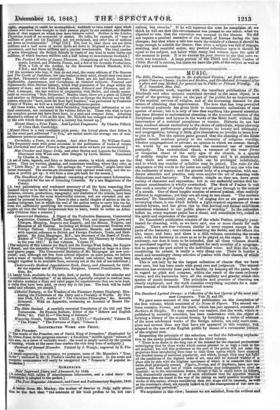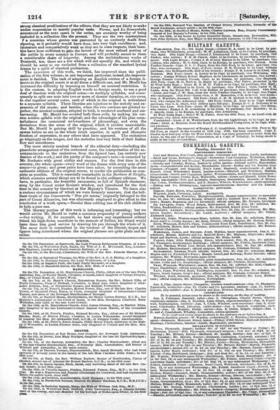We gave some account of this serial publication on the
completion Of 48 the first volume, which consisted of Le None di Figaro. The second vu:ifi lume contains Norma; • and the third, which has just appeared, contains /Vas Barbiere di Siviglia. W e may remind our readers, that the work, which: line published in monthly numbers, has been undertaken with the object eiars forming a library of the musical drama, by furnishing a series of editions,sa of the most celebrated works of the foreign schools, not only more cons- plete and correct than any that have yet appeared in this country, bue.,9; adapted to the use of the English public by means of a vernacular version, of the original text. Respecting the principle of the selection, we find the following explana-'t tion in the newly-published preface to the third volume.
" There is no doubt in the long run of the demand for the classical productionistill
outstripping that for those works which cannot pretend to so high a rank in the art musical; bat still this preference on the part of the public will not deter the projectors from introducing from time to time those operas which have received the decided stamp of universal popularity, and which, though they may not fulfil all the conditions of the highest order of art, may still be deemed worthy of a place side by side with the brighter specimens of which it is intended that this series shall principally consist. Figaro, Norma, and Il Barbiere, have now ap- peared; the first and last of which compositions may indisputably be cited as classical: as to the intermediate drama, though it fall in merit below its fellows still, dramatically speaking, it is of such excellence that its apparent musical feebleness does not stand in the way of its taking an early position amongst the works of this series; always considering that the stage and its interests, as well as the musician's closet, are equally looked, to by the management of our now ra- pidly-succeeding periodical." We acquiesce in this view; because we are satisfied, from the evident and
strong classical predilections of the editors, that they are not likely to make undue concessions to merely popular taste. Norma, and La Sonnambula, announced as the next opera in the series, are certainly worthy of being included in a collection like the present. They are the two masterpieces
f a musician whose genius was prevented by an untimely death from ripening, as it probably would have done, into very high excellence; and, immature and comparatively weak as they are in some respects, their beau- ties have been sufficient to gain the favour of the most refined portion of the public in every country in Europe, and will probably secure to them a considerable share of longevity. Among the multitudinous works of Donizetti, too, there are a few which will not speedily die, and which we should be sorry to see excluded from a collection of the standard lyrical drama by a spirit of classical puritanism.
The execution of this work, we think, has improved since the publi- cation of the first volume; in one important particular, indeed, the improve- ment is decided. The task of adapting an English version of a foreign li- bretto to the original music is at all times a difficult one, and Mr. Mould has increased the difficulty by imposing on himself an unusual restriction. It is the custom, hi adapting English words to foreign music, to use a good deal of freedom with the original notes,-to multiply syllables, and conse- quently to split one note into two or more of shorter duration, or, vice versa, to slur together several notes, each of which in the original is articulated to a separate syllable. These liberties are injurious to the melody and ex- pression of the music; and besides, when the two versions are printed to- gether, the musical notation, adapted to both, is rendered confused and em- barrassing. Mr. Mould has avoided both these evils, by making his ver- sion totidem syllabic with the original; and the advantages of his plan coun- terbalance the occasional awkwardness of phraseology, and even the deviations from the sense of the original, which it renders unavoidable. But Mr. Mould is gaining skill by practice; and his versions of all the operas before us are on the whole much superior, in spirit and idiomatic freedom of expression, to any others that have appeared. The recitatives go trippingly on the tongue, and the melodies lose very little of their Italian flow and smoothness.
The more strictly musical branch of the editorial duty-including the pianoforte arrangement of the orchestral score, the interpretation of the ac- companiments to the recitatives from the figured bass, (an entirely new feature of the work,) and the purity of the composer's text-is executed by Mr Rockstro with great ability and success. For the first time in this country, the whole opera-every word of the drama with every note of the music-is given; and great pains have been taken, by consulting the most authentic editions of the original scores, to render the publication as com- plete as possible. This is especially remarkable in the Barbiere di Siviglia, which contains several things not to be found in thi ordinary editions. We have, in particular, the beautiful canzonetta, so full of Spanish character, sung by the Count under Rosina's window, and introduced for the first time in this country by Gardoni at Her Majesty's Theatre. We learn also a curious circumstance of which we were formerly unaware, that the bril- liant finale of the Cenerentola," Non pih meats," originally belonged to the part of Count Almaviva, but was afterwards employed to give effect to the conclusion of a weak opera,-Rossini thus robbing one of his rich children to help a poor one.
The literary portion of this work is informing and interesting; but we would advise Mr. Mould to resist a common propensity of young authors -fine writing. If, for example, he had shown any experienced critical friend his high-flown exordium to the memoir of Bellini, his friend would have done him good service by drawing his pea through the whole of it. The same fault is committed in the versions of the libretti; tropes and figures being introduced where the original phrases are quite plain and fa- miliar.



























 Previous page
Previous page